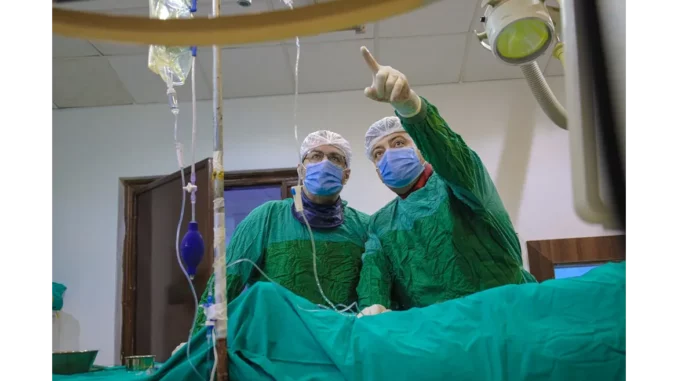
In the rapidly advancing realm of healthcare technology, artificial intelligence (AI) emerges as a catalyst for transformative changes in disease detection and patient care. Ultromics, a pioneering healthcare company based in the United Kingdom, stands at the forefront of this innovation. The company has recently achieved a significant breakthrough by securing clearance from the United States Food and Drug Administration (FDA) for its AI-powered screening tool, EchoGo Amyloidosis, designed to diagnose cardiac amyloidosis. To gain deeper insight into this development and its far-reaching implications, I had the privilege of engaging in a dialogue with Dr. Emma Barnes, a distinguished cardiologist and researcher closely collaborating with Ultromics.
As I entered Dr. Barnes’ office, the atmosphere was a harmonious blend of professionalism and palpable excitement, reflecting the groundbreaking nature of the work undertaken. With a warm and welcoming smile, Dr. Barnes invited me to sit, and we delved into a discussion about the innovative EchoGo Amyloidosis software. “It is an exhilarating time in cardiology,” she began, her enthusiasm evident. “The FDA clearance of EchoGo Amyloidosis represents a pivotal moment, not only for Ultromics but also for the entire field of cardiac diagnostics.”
Dr. Barnes elaborated on the condition of cardiac amyloidosis, characterised by the accumulation of amyloid proteins in the heart tissue, which, if left undetected, can lead to heart failure. Traditionally, diagnosing this condition has posed significant challenges, often necessitating high levels of clinical expertise and sophisticated imaging techniques. This is where Ultromics’ innovation makes its mark. “The beauty of the EchoGo Amyloidosis tool lies in its capacity to analyse routine echocardiogram results,” she remarked. “By utilising AI to evaluate a single apical four-chamber image, the software can alert clinicians to indications of cardiac amyloidosis, facilitating earlier intervention and potentially enhancing patient outcomes.”
Dr. Barnes highlighted the collaborative effort underpinning this technological advancement. Developed with contributions from Janssen Biotech, a Johnson & Johnson company, and Pfizer, EchoGo Amyloidosis leverages state-of-the-art AI algorithms to assess echocardiographic data. This partnership ensured that the software was not only innovative but also clinically relevant and seamlessly integrable into existing healthcare systems. When asked about the impact of this FDA clearance, Dr. Barnes underscored the importance of accessibility. “Cardiac amyloidosis is notoriously underdiagnosed. EchoGo Amyloidosis democratises access to sophisticated diagnostic tools, enabling clinicians across diverse settings to make informed decisions quickly.”
Our conversation ventured into the broader implications for patients and clinicians. Dr. Barnes emphasised that while AI is a formidable tool, it is designed to augment, not replace, the role of clinicians. “It’s about providing an additional layer of support,” she explained. “Clinicians can rely on EchoGo Amyloidosis to identify potential cases of cardiac amyloidosis earlier than traditional methods might allow, thereby paving the way for timely and targeted treatments.” She acknowledged the challenges associated with integrating AI into healthcare. “There is always a learning curve when introducing new technology,” she admitted. “But the potential benefits far outweigh the challenges. With proper training and adaptation, AI tools like EchoGo Amyloidosis can become invaluable assets in the clinical toolkit.”
As our discussion drew to a close, I was struck by Dr. Barnes’s optimism and forward-thinking approach. Her insights illustrated a future where AI not only empowers clinicians but also significantly improves patient care. The FDA clearance for Ultromics’ EchoGo Amyloidosis is a testament to the possibilities that lie at the intersection of technology and medicine. Leaving Dr. Barnes’s office, I felt a renewed sense of hope for the future of cardiac diagnostics. EchoGo Amyloidosis represents more than just a technological milestone—it embodies a shift towards more precise, accessible, and effective healthcare solutions.
In the insightful words of Dr. Ross Upton, CEO and founder of Ultromics, “Echocardiography is a powerful tool for evaluating cardiac structure and function and is central to the detection and monitoring of disease.” With innovations like EchoGo Amyloidosis, we are indeed witnessing the dawn of a new era in cardiac care. The fusion of AI with medical practice holds the promise of revolutionising diagnostics, offering a glimpse into a future where healthcare is not only more accurate but also more inclusive and patient-centered.


Be the first to comment